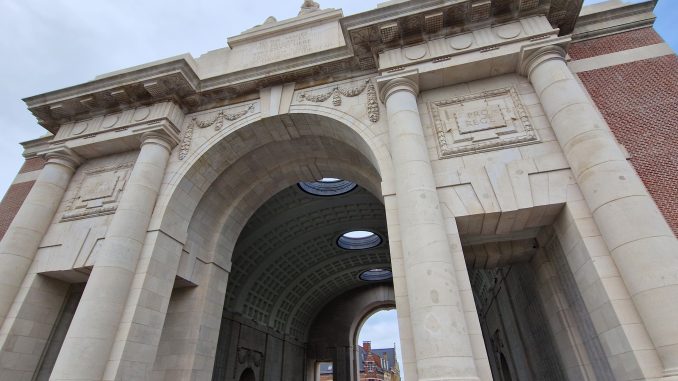
A poignant stop off on the way home from Brussels. The Menin Gate Memorial, Ypres.
I don’t always bother with a blog about the journey home, but today we stopped at the Menin Gate, a throughly sobering memorial to lives lost in an appalling and futile war.

Technically, Belgium was neutral in the First World War – or The Great War as it was known, until they needed to start numbering them. But when Germany decided to roll through Belgium to get around the French defences, neutrality went out of the window.
The causes of the war were complex and, to a certain extent, disputed. Arch Duke Franz Ferdinand was assassinated in Sarajevo (today, the capital of Bosnia) on 24th June 1914. He was the heir to the throne of the Austria-Hungary Empire. To cut a long story short, four weeks later Austria-Hungary declared war on Serbia. Russia decided to step in to support Serbia. France was an ally of Russia, so they were dragged in. Germany and The Ottoman Empire were allies of Austria-Hungary – and so it snowballed.
At the time, the British Empire was at its prime. Twenty-five percent of the population of the entire planet was under British rule. The expansion of the German Empire was not something Britain wanted to contemplate, so when German forces rolled through Belgium to come at France from the north, the British Expeditionary Forces were deployed.
Germany had expected the ‘Western Front’ to be an easy win, but it would become a horrendous slog that would see millions of soldiers die, with very little progress made by either side.
Ypres became a focal point because it was a link to vital ports on the coast. At the start of the war Germany captured Ypres but were sent packing after just six days.

For the following four years British and Commonwealth soldiers (yes, the likes of Australia and New Zealand were dragged into this European war) slugged it out in horrendous conditions from a huge network of trenches.
It was in these trenches that ‘mine-warfare’ was invented. Engineers, often coal miners in civie street, tunnelled under enemy lines and planted explosives, blowing up enemy forces. It was also here that mustard gas was first used, kicking off an era of chemical warfare.
There were a number of hills overlooking Ypres and the high ground was considered to be a vital military asset. Historians often break down Ypres into five major battles over these hills, the most famous being Pashendale. Combined, these battles accounted for over a million deaths and many more casualties.
One interesting positive story is the Wipers Times. A newspaper set up by troops utilising a printing press found in the town. ‘Wipers’ being how many of the troops pronounced ‘Ypres’. It was printed and distributed in the trenches and contained many satirical articles and criticism of the high command. The story of the paper was turned into a movie in 2014 and can be watched here.
As well as the human toll, the town of Ypres was almost completely demolished. The beautiful ancient city you see today is less than one hundred years old, reconstructed from the original drawings.

There are many war graves in the area but the Menin Gate was constructed as a memorial to the fallen whose remains had not been found, and was completed in 1927. The names of more than 54,000 soldiers are inscribed on the walls of the gate. At the opening ceremony, Field Marshall Lord Plumber uttered the words, “He is not missing, he is here,” reassurance to the families of the fallen that even though they may be absent, they will never be forgotten.

As and when the remains of missing soldiers are identified, presumably through construction excavation and farming, their body is laid to rest in one of the war cemeteries and their name removed from the gate. Although there can be a delay in the removal for practical considerations regarding the structural integrity of the gate.
Since 2nd July 1928 traffic has been stopped from travelling under the gate and the Last Post played at 8pm, every day.
Our bus arrived around midday and we all filed off, silent and thoughtful. We try to take in the tragic magnitude of what the gate represents and Snowy lays a wreath of poppies supplied by the Royal British Legion with a card stating it was on behalf of Wales football fans.
After a brief walk around the gate, overwhelmed by the sheer number of names on the gate, we then head back to the bus and head for home.
I reflect on the war that was often referred to as ‘the war to end all wars’ and ponder on the number of wars we have had since. Many of us have grown up thinking the borders of European nations have finally been agreed for good. However, events of recent years have proven that, sadly, the only lesson from history that we have learned, is that we do not learn the lessons of history.


